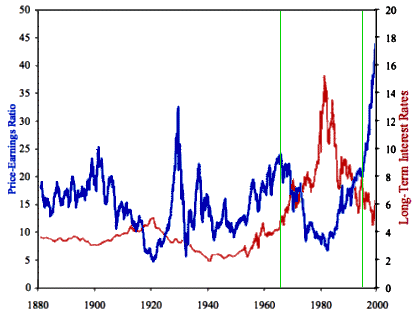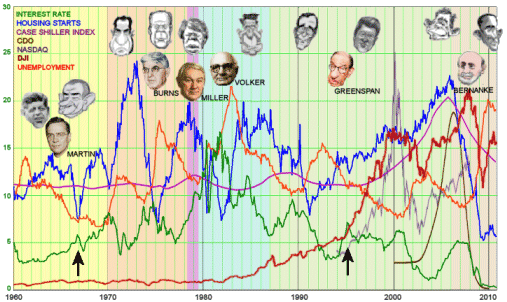It’s hard for me to really believe that a single force can be as destructive as I’m beginning to believe Alan Greenspan was in our Financial woes. He’s getting right up there with the greats of recent history like Dick Cheney. He seems to have carried several core beliefs that lead him astray. This post will look at the big consequence of his beliefs – his failure to raise interest rates in 1995 as his first Recession abated – and compare it to a previous time in 1967 when one of his predecessors at the Fed [William McChesney Martin] faced a similar challenge and did the right thing. This is the Price/Earnings chart that Robert Shiller showed to Greenspan in December 1996. I’ve added the two green lines. The right-hand line marks Greenspan’s fatal error. The left-hand line marks Martin’s response in an identical situation. You can easily see that Martin dealt with the irrational over-valuing of stocks effectively – the overvaluing began to fall. Greenspan, is a similar circumstance, did not succeed – in fact the madness escalated:

I’ve marked these same points on my spaghetti graph. First look at 1967 [left-hand arrow]:

Martin was bringing the Interest Rates up as Unemployment fell after a Recession. In 1967, the Unemployment stopped falling and he tweaked the Interest Rate up a bit. As expected, housing starts fell briefly. But then, he began to raise the Interest Rates again. By the next Recession, his successor had some wiggle room and was able to deal with things effectively. The Irrational Exuberance of the Market, top graph, was checked.
Now look at the right-hand arrow. Greenspan was raising the Interest Rates as a Recession abated. When the fall in Unemployment faltered, he did what Martin did, tweaked the Interest Rates up a bit, but then he lowered them and kept them low! And everything went crazy [irrational] – housing starts, the DOW, the NASDAQ, the home values. A year or so later, Shiller showed it to him in spades, and Greenspan coined the term, Irrational Exuberance, but then ignored the warning for five years. By then, it was too late.
Sorry, the comment form is closed at this time.